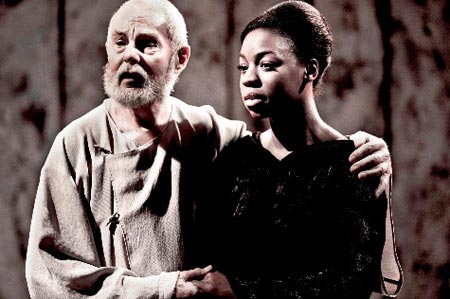“Don’t grow old.” It’s a too-pat theme for such a deep work as King Lear, of course, but it’s one of the obvious lessons any viewer (or, too often, reader) might reasonably take from Shakespeare’s most titanic tragedy.
Few of us look forward to aging, but once in a while we may indulge in anticipating with pleasure the greying of someone else—and it’s all theater’s fault. A part of me has been secretly waiting for a few dozen years for Derek Jacobi to reach the age where he could plausibly play Lear.
The time has come. In the event, Sir Derek is more limber and energetic at 72 than many a 40-something can claim to be. The “oldness” of his Lear is of the spirit.

Not that he isn’t eye-openingly brilliant at portraying a proud man’s decay from vigorous, optimistic retiree to tattered madman. He is. This is the best Lear I’ve seen, and Jacobi the most pathetically human embodiment of Shakespeare’s tragic King. It’s a beast of a role (a “peak in the Himalayas,” as he told the New York Times) in a beast of a play; neither is an undertaking for the faint of heart or weak of body.
But this lean and muscular staging, directed by the Donmar Warehouse’s outgoing Artistic Director Michael Grandage, sucks Lear down to its essence. The bleached timbers of the backdrop suggest medieval times, but the characters’ plain robes and the broad expanse of the bare stage place us anywhere and nowhere. The map on which the retiring king delineates his division of his domain splays across the floor in abstract shapes and earth tones. Much later, during the climactic battle scene, surely that’s the terrifying sound of a helicopter throbbing overhead. Shakespeare knew what he was doing, setting this tragedy of blood and betrayal in a mythical era rather than a political present. It’s a story for the ages.
Yet the best praise my pen can bestow on Sir Derek is that he makes it look easy. His is an utterly human Lear; everything and everyone around him seems regular-sized. Within the comfortable psychological space emanating from Mr. Jacobi’s persona, there’s ample room for the quiet nobility of Pippa Bennett-Warner’s Cordelia; the humble, surprising naturalism of Paul Jesson’s Gloucester; the comic cowardice of Amit Shah’s Oswald; the cold hauteur of Gina McKee’s Goneril paired with the more chilling, plainspoken reasonableness of Justine Mitchell’s duplicitous Regan; and even, or especially, the crowd-pleasing antics of Alec Newman as a delightfully villainous Edmund. Despite its presentation in the spacious BAM Harvey Theater, despite the large, bare stage, despite the dreadful story, the production feels intimate.
That Donmar would assemble a superb cast is to be expected, but what raises this show to Dover-cliff heights is the actors’ utter surrender to the ebb and flow (mostly flow) of the action. Exemplifying their dedication and openness, Sir Derek proves once again he’s one of our most generous actors—by which I mean he has that hard-to-define ability to invite us in to the mind of the character, to give us all of him, seemingly without effort. (Though we can see what it takes out of him during the curtain call.)
For many Americans in their 40s and older, our first glimpse of Derek Jacobi was on television in the opening scene of the BBC’s I, Claudius. Caked with old-man makeup, ready to relate Robert Graves’ version of the saga of the Roman emperors, he stooped and shuffled and creaked. The actor was in his 30s then, the “prime of life” by many reckonings, and merely disguised as an old man. Already a seasoned Hamlet at the time, he went on to do a wonderful Richard II, plenty of other Shakespeare, and more modern historical dramas like Brother Cadfael. Now at an age when many are retired, Derek Jacobi seems to be in the “prime of life” anew, giving us everything he’s got as he shows us the fresh, unvarnished, earthy King Lear the 21st century needs.
 Blogcritics The critical lens on today's culture & entertainment
Blogcritics The critical lens on today's culture & entertainment



